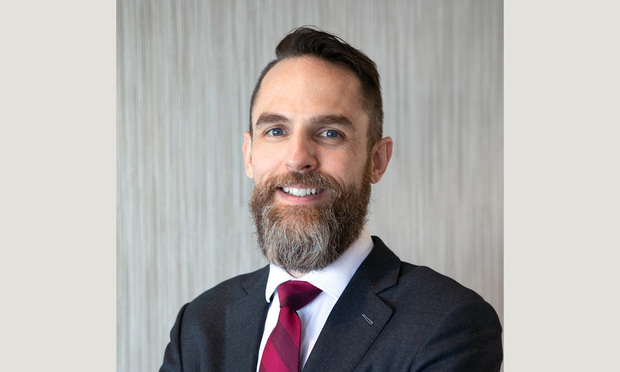Know Your Rights When Protesting: A Q&A With Mike Howard
You have the right to remain silent. But if asked by a police officer, you must identify yourself otherwise you risk being arrested for failure to identify, says Mike Howard, a Dallas criminal defense attorney.
June 09, 2020 at 06:04 PM
4 minute read
 Mike Howard, criminal defense attorney in Dallas, Texas.
Mike Howard, criminal defense attorney in Dallas, Texas.
Mike Howard has a deep background in civil rights, criminal defense and protests. He is a Dallas criminal defense attorney focused on representing people in Dallas, but he has also been in leadership positions in the ACLU, Bill of Rights Defense Committee, and Lawyers for America—with a particular focus on protests, "know your rights," and legal observing. Texas Lawyer had the chance to speak recently with Howard about protests and knowing your rights.
What are your basic rights if you are going to protest?
Per Howard —
- You have the right to remain silent. But if asked by a police officer, you must identify yourself otherwise you risk being arrested for failure to identify.
- Beyond identifying yourself if asked, you do not have to answer any additional questions from law enforcement officers.
- You have the right to peaceably assemble on public property. However unless you receive express prior permission, this right does not extend to private property.
- A permit is not required in order to march or protest on public sidewalks. However, you cannot block public sidewalks or streets. Obstruction is typically the most common basis for arrests during protests.
- Freedom of speech is a constitutionally guaranteed right. Even if your message is unpopular or controversial.
- You have the right to photograph/video anything in public view.
- You have the right to film the police—including arrests—as long as you don't get so close that you are interfering.
- If the police confiscate your phone you do not have to provide your password.
What should you do if you are protesting?
- Be mindful of what you take with you to a protest. In the event you are arrested you do not want to risk enhanced charges by having anything illegal in your possession.
- Take your ID, as well as a phone or other means of communication.
- Notify a relative or friend that you attending the protest. It's best to check in with that person at prearranged times before and after so they know you are safe.
- If you are going as part of a group, have a prearranged meetup spot so you can make sure everyone is safe and accounted for, pre- and post-protest event.
- Write down the phone number—in permanent marker—of someone who is either (1) not at the protest, knows you're protesting, and is willing to be your point of contact in case of arrest or (2) a legal observer service.
- If you witness someone being arrested, remain at a safe and respectful distance, then ask that person to shout out their name and date of birth to you. Notify protest organizers, legal observers, or at least your emergency contact (or theirs if they have one).
- If you are being arrested, shout out your name and info to someone close by so they can notify organizers or legal observers.
What should you avoid when protesting?
- Don't block sidewalks or traffic. This will almost always result in your arrest.
- Don't rely on "I have my emergency contact's number on my phone in case of problems." Write it on your arm in permanent marker.
- Don't get too close to or physically touch any police officer or police animals.
- If someone is being arrested—even if you feel it's unlawful—don't interfere. That person is counting on you to notify someone that they're being arrested.
If you are planning on civil disobedience, what should your plan be if you get arrested?
- Ideally you will be in contact with a legal observer program prior to the event. But at a minimum, it's vitally important that you have an emergency contact who knows your plan and is ready to act on your behalf.
Mike Howard is a criminal defense attorney in Dallas. He can be reached at www.mikehowardlaw.com.
This content has been archived. It is available through our partners, LexisNexis® and Bloomberg Law.
To view this content, please continue to their sites.
Not a Lexis Subscriber?
Subscribe Now
Not a Bloomberg Law Subscriber?
Subscribe Now
NOT FOR REPRINT
© 2025 ALM Global, LLC, All Rights Reserved. Request academic re-use from www.copyright.com. All other uses, submit a request to [email protected]. For more information visit Asset & Logo Licensing.
You Might Like
View All
Special Counsel Jack Smith Prepares Final Report as Trump Opposes Its Release
4 minute read
'Serious Disruptions'?: Federal Courts Brace for Government Shutdown Threat
3 minute read
Government Attorneys Are Flooding the Job Market, But Is There Room in Big Law?
4 minute read
Overtime Rewind: Texas Court Ruling Unravels FLSA Salary Level Increases
4 minute readTrending Stories
- 1'It's Not Going to Be Pretty': PayPal, Capital One Face Novel Class Actions Over 'Poaching' Commissions Owed Influencers
- 211th Circuit Rejects Trump's Emergency Request as DOJ Prepares to Release Special Counsel's Final Report
- 3Supreme Court Takes Up Challenge to ACA Task Force
- 4'Tragedy of Unspeakable Proportions:' Could Edison, DWP, Face Lawsuits Over LA Wildfires?
- 5Meta Pulls Plug on DEI Programs
Who Got The Work
Michael G. Bongiorno, Andrew Scott Dulberg and Elizabeth E. Driscoll from Wilmer Cutler Pickering Hale and Dorr have stepped in to represent Symbotic Inc., an A.I.-enabled technology platform that focuses on increasing supply chain efficiency, and other defendants in a pending shareholder derivative lawsuit. The case, filed Oct. 2 in Massachusetts District Court by the Brown Law Firm on behalf of Stephen Austen, accuses certain officers and directors of misleading investors in regard to Symbotic's potential for margin growth by failing to disclose that the company was not equipped to timely deploy its systems or manage expenses through project delays. The case, assigned to U.S. District Judge Nathaniel M. Gorton, is 1:24-cv-12522, Austen v. Cohen et al.
Who Got The Work
Edmund Polubinski and Marie Killmond of Davis Polk & Wardwell have entered appearances for data platform software development company MongoDB and other defendants in a pending shareholder derivative lawsuit. The action, filed Oct. 7 in New York Southern District Court by the Brown Law Firm, accuses the company's directors and/or officers of falsely expressing confidence in the company’s restructuring of its sales incentive plan and downplaying the severity of decreases in its upfront commitments. The case is 1:24-cv-07594, Roy v. Ittycheria et al.
Who Got The Work
Amy O. Bruchs and Kurt F. Ellison of Michael Best & Friedrich have entered appearances for Epic Systems Corp. in a pending employment discrimination lawsuit. The suit was filed Sept. 7 in Wisconsin Western District Court by Levine Eisberner LLC and Siri & Glimstad on behalf of a project manager who claims that he was wrongfully terminated after applying for a religious exemption to the defendant's COVID-19 vaccine mandate. The case, assigned to U.S. Magistrate Judge Anita Marie Boor, is 3:24-cv-00630, Secker, Nathan v. Epic Systems Corporation.
Who Got The Work
David X. Sullivan, Thomas J. Finn and Gregory A. Hall from McCarter & English have entered appearances for Sunrun Installation Services in a pending civil rights lawsuit. The complaint was filed Sept. 4 in Connecticut District Court by attorney Robert M. Berke on behalf of former employee George Edward Steins, who was arrested and charged with employing an unregistered home improvement salesperson. The complaint alleges that had Sunrun informed the Connecticut Department of Consumer Protection that the plaintiff's employment had ended in 2017 and that he no longer held Sunrun's home improvement contractor license, he would not have been hit with charges, which were dismissed in May 2024. The case, assigned to U.S. District Judge Jeffrey A. Meyer, is 3:24-cv-01423, Steins v. Sunrun, Inc. et al.
Who Got The Work
Greenberg Traurig shareholder Joshua L. Raskin has entered an appearance for boohoo.com UK Ltd. in a pending patent infringement lawsuit. The suit, filed Sept. 3 in Texas Eastern District Court by Rozier Hardt McDonough on behalf of Alto Dynamics, asserts five patents related to an online shopping platform. The case, assigned to U.S. District Judge Rodney Gilstrap, is 2:24-cv-00719, Alto Dynamics, LLC v. boohoo.com UK Limited.
Featured Firms
Law Offices of Gary Martin Hays & Associates, P.C.
(470) 294-1674
Law Offices of Mark E. Salomone
(857) 444-6468
Smith & Hassler
(713) 739-1250






